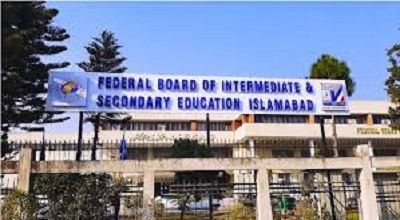Federal Board Islamabad (FBISE)
Federal Board Islamabad (FBISE): The Federal Board of Intermediate & Secondary Education (FBISE) is an autonomous educational body in Pakistan, established in 1975 under the Ministry of Federal Education and Professional Training. Its primary responsibilities include conducting examinations at the secondary (Matric) and intermediate (F.A/F.Sc) levels, affiliating educational institutions within Pakistan and abroad, and ensuring the standardization and quality of education in affiliated schools and colleges.
FBISE plays a crucial role in the Pakistani education system by setting curricula, conducting fair and transparent exams, and awarding certificates that are recognized both nationally and internationally. It covers a wide range of institutions, including public and private schools, and extends its services to Pakistani schools abroad.
- Brief Overview of FBISE: Introduction to the FBISE, its role, and its significance in the Pakistani education system.
- Establishment and Evolution: A Historical Perspective on the Establishment of FBISE in 1975, its mandate, and its growth over the decades.
The Birth of FBISE
- Foundation and Objectives: Discuss the reasons behind the creation of FBISE, focusing on the need for a central authority for secondary and intermediate education.
- Initial Challenges: Outline the initial challenges faced by FBISE in standardizing education across diverse regions.
Organizational Structure and Functions
- Governance: The administrative setup, including the Board of Governors and their roles.
- Core Functions: Examination, curriculum standardization, affiliation of schools/colleges, and certification.
Expansion and Affiliation Across Pakistan
- Affiliation Process: Detailed explanation of the affiliation process, including criteria for schools and colleges.
- Growth Over the Years: The gradual expansion of FBISE’s reach to include schools and colleges across all provinces, including remote areas.
- Diversity of Institutions: Types of schools and colleges affiliated with FBISE, ranging from public schools to elite private institutions.
FBISE’s Role in Educational Reforms
- Curriculum Development: FBISE is involved in developing a uniform curriculum and ensuring quality education.
- Examination Reforms: Changes and improvements in the examination system, including the introduction of computerized marking and online results.
- Standardization of Education: Efforts by FBISE to create a standardized educational experience across Pakistan, ensuring equal opportunities for all students.
Impact of FBISE on Education in Pakistan
- Educational Quality: The impact of FBISE’s policies on the quality of education in affiliated institutions.
- Comparison with Other Boards: How FBISE compares with other provincial and regional educational boards in terms of quality and standards.
- Success Stories: Highlighting notable achievements of FBISE-affiliated schools and colleges, including high-achieving students and institutions.
Challenges and Criticisms
- Geographical Challenges: Issues related to the inclusion of remote and underdeveloped regions in FBISE’s jurisdiction.
- Criticism from Educators: Common criticisms from educators and institutions regarding the board’s policies.
- Adapting to Modern Educational Needs: The challenge of keeping up with global educational trends and technological advancements.
Future Directions and Innovations
- Digital Transformation: FBISE’s move towards digital platforms, online examinations, and e-learning.
- Inclusivity and Accessibility: Plans to ensure that all regions, including marginalized communities, have equal access to FBISE’s resources.
- Vision for the Future: Long-term goals of FBISE, including possible expansions, reforms, and collaborations.
Conclusion
- Summary of Achievements: Recap of FBISE’s impact on education in Pakistan and its key achievements over the decades.
- The Road Ahead: Final thoughts on the future of FBISE and its role in shaping Pakistan’s educational landscape.
Frequently Asked Questions (FAQs)
1: What is FBISE, and what are its main responsibilities?
FBISE is the Federal Board of Intermediate & Secondary Education responsible for conducting exams, affiliating schools, and standardizing education at the secondary and intermediate levels across Pakistan.
2: How does a school or college get affiliated with FBISE?
Schools and colleges must meet specific criteria set by FBISE, including infrastructure, faculty qualifications, and adherence to the board’s curriculum. They must apply for affiliation and undergo an evaluation process.
3: What are the benefits of FBISE affiliation for schools?
Affiliation with FBISE ensures standardized education, access to updated curricula, participation in nationwide exams, and recognition of certificates at the national and international levels.
4: How does the FBISE ensure the quality of education in affiliated institutions?
FBISE regularly reviews curricula, conducts teacher training programs, and performs inspections to ensure that affiliated institutions maintain the required standards of education.
5: Can students from other provinces appear for the FBISE exams?
Yes, students from all provinces, as well as overseas Pakistani students, can appear for FBISE exams, provided they are enrolled in an affiliated institution.
6: What steps has FBISE taken towards digitalization?
Federal Board Islamabad (FBISE) has introduced online registration, digital mark sheets, and computerized exam checking, and is working on implementing online examination systems.
7: How does FBISE handle educational discrepancies and grievances?
The Federal Board Islamabad (FBISE) has a grievance redressal system, allowing students, parents, and institutions to file complaints, which are addressed systematically.
8: What are the plans of FBISE regarding educational reforms?
Federal Board Islamabad (FBISE) aims to expand digital learning, incorporate modern educational technologies, and ensure that all regions of Pakistan have equal access to quality education under its jurisdiction.
